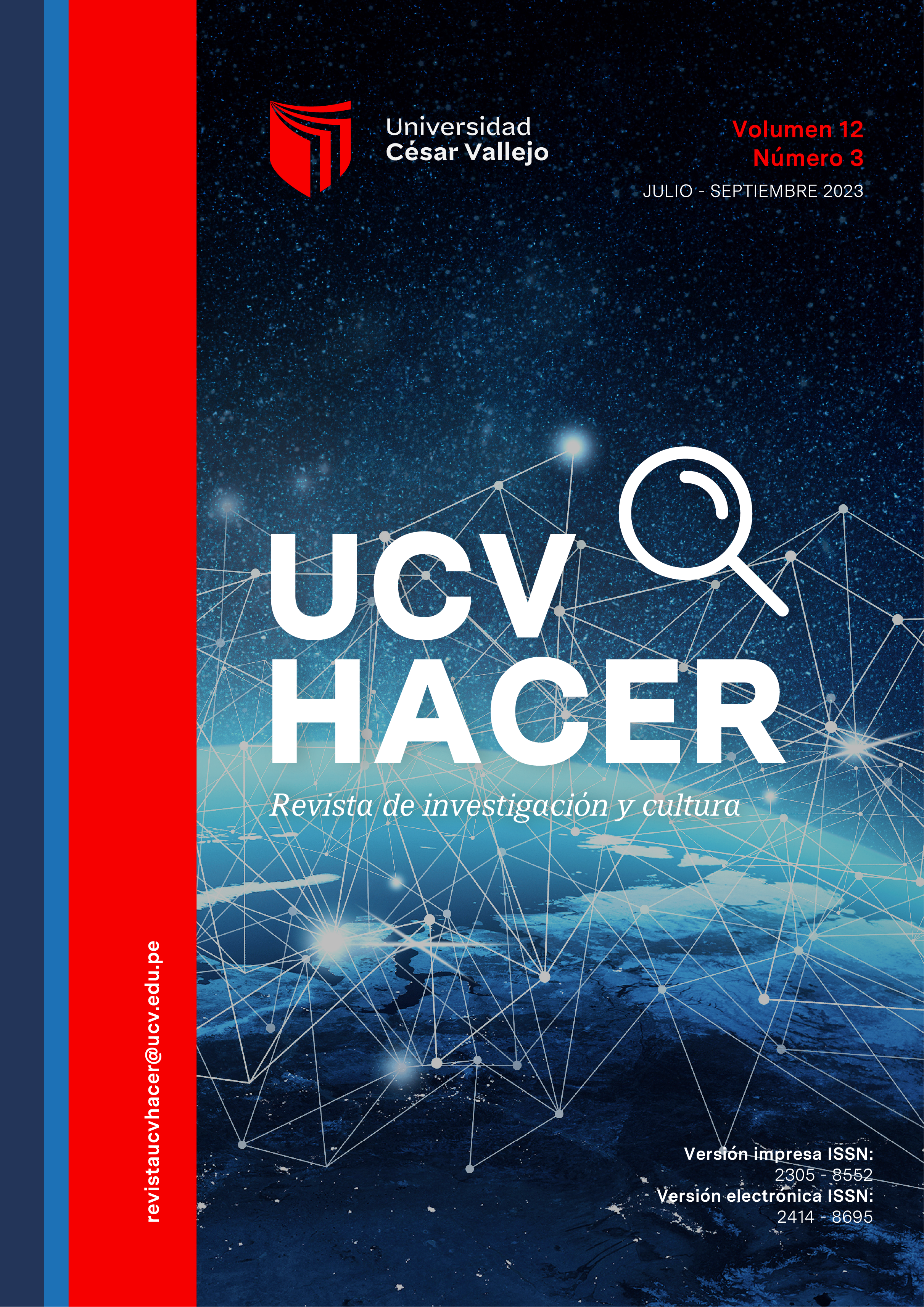Positive Reinforcement in Coping with Couple Separation: Case Study, Chiclayo 2021
DOI:
https://doi.org/10.18050/revucvhacer.v12n3a4Keywords:
Coping Strategies, Positive Reinforcement, Couple Separation, Intra-subject, ExperimentAbstract
Objective: Determine the effects of positive reinforcement in coping with couple separation: Case study, Chiclayo 2021. Method: An experimental investigation was carried out, with a type of single case within-subject design; Positive reinforcers were used in order to permanently change the negative behaviors generated from psychological abuse and separation from the couple. To know the coping strategies used by the patients, the Coping Strategies Inventory (CSI) was used, which was applied as a pretest and post test. Results: It was observed that the evaluated uses the emotional expression strategy with a higher frequency with a percentile of 85, which means that she focuses her attention on her emotions, which overwhelm her and does not allow her to focus her attention on cognitive restructuring to solve her problems. After the application of the program through positive reinforcers such as extinction of aversive behaviors, social reward, positive self-image and self-concept, dialogue with family and friends, social interaction, informative feedback and strategic changes of thought and action, it has been possible to advance in a significant, insofar as attention has been focused on solving the problem. Conclusions: It has been possible to empower the patient insofar as she has stopped criticizing herself and seeing herself as a woman with power and with the desire to take charge of herself; emotional and economic dependence has ceased to be a constant; the evasion of problems has transformed it into affective, maternal and labor potentialities: mentally she feels fortified being able to face her ex-partner to dialogue and decide on the future of the children; she has come to conceive that self-realization depends on her and that being happy is not an idea, but a personal decision.
Keywords: Coping Strategies, Positive Reinforcement, Couple Separation, Intra-subject, Experiment
Downloads
References
Anguita A. (2017). Proposal for intervention in emotional dependency. Overcoming dependency after a couple breakup [Master’s thesis, Autonomous University of Madrid, Spain]. https://repositorio.uam.es/bitstream/handle/10486/680162/anguita_corbo_
alba_tfm.pdf?sequence=1
Bados A and Garcia Grau E. (2011). Operant techniques. University of Barcelona. http://diposit.ub.edu/dspace/bitstream/2445/18402/1/T%C3%A9cnicas%20operantes%202011.pdf
Banquero P & Paredes E. (2019). Emotional dependency and coping strategies in women victims of intimate partner violence: “The Three Manuelas” Comprehensive Support Center [graduation work in Clinical Psychology in Internet]. Central University of Ecuador. http://www.dspace.uce.edu.ec/bitstream/25000/20403/1/T-UCE-0007-CPS-214.pdf
Bodensee J. (2019). International Family Day: this is how divorces go in Latin America. SPUTNIK [Internet]. https://mundo.sputniknews.com/20190515/dia-internacional-familia-divorcios-en-america-latina-1087252229.html
Bulacio J, Vieyra M, Álvarez D & Benatuil D. (2004). The use of psychoeducation as a therapeutic strategy. XI Research Conference. Faculty of Psychology - University of Buenos Aires. https://www.aacademica.org/000-029/16.pdf
Cano F, Rodríguez L & García J. (2007). Spanish adaptation of the Coping Strategies Inventory. Spanish Records of Psychiatry, 35(1), 29-39. http://hdl.handle.net/11441/56854
Carmona C. (2012). Intervention to grief due to couple breakup from cognitive behavioral therapy based on the analysis of four cases. Polysemy
Carrasco E, Padilla N, and Pérez L. (2021). The use of psychological resources in the reasons for the breakup. Electronic Journal of Psychology Iztacala, 24(2). https://www.medigraphic.com/pdfs/epsicologia/epi2021/epi212t.pdf
Castro J. (2002). Psychological Research Methods, Design, and Techniques (first Ed.). University of Las Palmas de Gran Canaria.
Chingay C. (2021). Main causes that influence divorce [Thesis for the bachelor’s degree]. http://repositorio.upagu.edu.pe/bitstream/handle/UPAGU/1525/Trabajo%20de%20Investigaci%C3%B3n%20PDF.pdf?sequence=1&isAllowed=y
Esnaola I, Goñi A and Madariaga J. (2008). The self-concept: research perspectives. Journal of Psychodidactics, 12(1), 69-96. https://www.redalyc.org/pdf/175/17513105.pdf
Espinoza V, Salinas J and Santillán C (2018). Incidence of mourning in the break-up of university students in a Crisis, Emergency and Suicide Care Center (CREAS). Journal of Behaviour, Health & Social Issues, 9(2), 7-35. https://doi.org/10.1016/j.jbhsi.2018.01.001
Garavito S, Garcia F, Neira M & Puentes E. (2020). Couple breakup in young adults and mental health: coping strategies in the face of the stress of ending a relationship. Psychology, 14(1), 47-59. https://revistas.usb.edu.co/index.php/Psychologia/article/view/4560/3686
García, F. & Ilabaca, D. (August 2013). Couple breakup, coping and psychological well-being in young adults. Ajayu, 11(2), 42-60. http://
www.scielo.org.bo/scielo.php?script=sci_arttext&pid=S2077-21612013000200003
Guzman G. (2021). Premack’s principle: what it is and what role it plays in behaviorism. Psychology and mind. https://psicologiaymente.com/psicologia/premack-principle
Infobae. (2021). Divorces in Peru reached their historical peak: 7,386 so far in 2021. Apifox. https://www.infobae.com/america/peru/2021/10/20/divorcios-enperu-alcanzaron-su-pico-historico-7386-en-lo-queva-del-2021/
Jimeno A & Conejero S. (January, 2019). Emotional regulation and coping: Conceptual approach and strategies. Mexican Journal of
Psychology, 36(1): 74-83. https://www.redalyc.org/journal/2430/243058940007/html/
Montano N. (2011). Psychological characteristics of women from 20 to 35 years of age, abused by their partner [Thesis report to obtain the title of Clinical Psychologist]. http://www.dspace.uce.edu.ec/handle/25000/2765
Morán C, Landero R and González M. (2010). COPE28: A psychometric analysis of the Spanish version of Brief COPE. Univ. Psychol, 9(2), 543-552. http://pepsic.bvsalud.org/pdf/up/v9n2/v9n2a20.pdf
Nezu A, Maguth C, & Lombardo E. (2006). Formulation of cases and design of cognitivebehavioral treatments. A problem-based approach. Editorial. The Modern Manual, S. A. of C. V https://cideps.com/wp-content/uploads/2014/05/CognitivoBehavioral-1edi1.pdf
Restrepo, M. (2021). Background and current status of conditioning theory. Psychology Magazine, 25, 11-20.
Rodrigo R. (2020). Secondary reinforcements: examples and definition. Studying. https://estudyando.com/refuerzos-secundarios-ejemplos-y-definicion/
Rodríguez B. (2020). Intervention proposal for emotional dependency after a couple breakup promoting resilience and post-traumatic growth [master’s thesis]. https://ebuah.uah.es/dspace/bitstream/handle/10017/47717/TFM_RODRIGUEZ_ECIJA_2020.pdf?sequence=1&isAllowed=y
Downloads
Published
How to Cite
Issue
Section
License
Copyright (c) 2023 Edulgerio Fernández Díaz

This work is licensed under a Creative Commons Attribution 4.0 International License.










